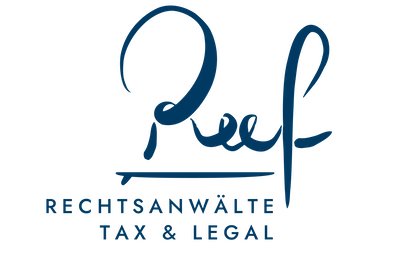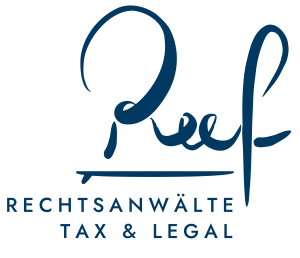Taxes when
buying and selling a company

The taxes involved in a company acquisition are varied and complex. No wonder, given that the sale of a company and company participation are among the most demanding transactions in Germany. They are also referred to as mergers & acquisitions. As not all details are regulated by law, a complex contract must be drawn up to ensure legal security. Aspects such as the purchase price, the motive for the purchase and the financing are just some of the decisive elements.
Your M&A partner for optimised taxes when buying a company
You want taxes save money when buying a company? Then you can rely on our decades of experience in tax law, commercial & corporate law and labour law. From our office in Düsseldorf, our team will support you from planning to finalisation and beyond:
- Drafting of a preliminary agreement or a soft letter of intent
- Tax planning (incl. tax burden comparison)
- Preparation for the Financial, legal and tax due diligence
- Risk assessment through due diligence documentation
- Drafting of the purchase agreement (tax and guarantee clauses, blocking and holding periods, tax transfer regulations, book value continuation, etc.)
- Design of a Non-disclosure agreement (Non-Disclosure Agreement)
- Support with acquisition financing (deduction restrictions, interest barrier)
- Tax-optimised integration of the acquired company
You can look forward to comprehensive support that covers the entire spectrum of your company purchase or sale. For an initial non-binding enquiry, please do not hesitate to contact us by telephone, our online contact form or via e-mail.
1 what is part of due diligence?
Due diligence is a comprehensive risk assessment to avoid unpleasant surprises when acquiring a company. Economic, legal and tax aspects are examined; financial, legal and tax due diligence.
As part of the due diligence process, the seller is usually given a checklist. This contains a request to compile the documents and information listed therein. This information forms the basis for the buyer's review.
A non-disclosure agreement is also an option. This agreement primarily offers protection to the seller who discloses sensitive information during the due diligence process.
2. FORMS OF COMPANY ACQUISITION
There are two forms of company acquisition. In a share deal, the buyer acquires shares (for example in a GmbH). The acquired shares cannot be amortised, but can be carried forward as an asset. If restructuring is imminent, the downstream merger model could be used for tax optimisation.
This contrasts with the asset deal, where all individual assets, liabilities and employees are transferred to the buyer (for example, the purchase of land, production facilities, etc.). In order to understand the differences, we will examine both procedures in detail.
a) Share deal
In a share deal, only the owner changes, the company remains the same. The company can be sold in part or as a whole. The sale only becomes effective through notarisation.
Relationships with third parties remain in place in a share deal. This includes, for example, contracts, licences or industrial property rights. Contracts with a change of control clause, on the other hand, allow a special right of cancellation if the majority of the company changes hands.
Liabilities to third parties are also assumed in a share deal. In this context, due diligence protects against unidentified inherited liabilities. Assurances, guarantees and warranties can also be included in the purchase agreement - for example, an assurance of the operational suitability or profitability of buildings or IT systems.
Good to know: Shareholder loans are generally contestable, which is why they should always be sold together with the company share. Otherwise, there is a claim for reimbursement if the company has to file for insolvency within one year of repaying the loan. The shareholder would then have to reimburse the payments received to the insolvency administrator.
A share deal is typical in the areas of venture capital, private equity, joint ventures and cross-border transactions - whenever the entrepreneurial risk for the target company is to be limited.
If the company acquisition is financed by a bank loan and the buyer is a natural person, it is advisable to establish a holding company, as the profits from the sale of a holding company are tax-free (Section 8b (2) sentence 1 KStG). This applies regardless of the shareholding. The share of the sale proceeds that exceeds the book value is deemed to be profit (Section 8b (2) sentence 2 KStG). Withdrawals into private assets are not deemed to be disposals.
From a liability law perspective, it may also make sense to establish an acquisition company (NewCo).
If the shareholding is at least 15%, the intercompany privilege applies with regard to trade tax in the event of a company sale. In accordance with Section 9 (1) no. 2a GewStG, the respective shareholding must exist at the beginning of the financial year.
If more than 25% of the shares in a corporation with a loss carryforward are purchased, the losses are reduced proportionately. If more than 50% of the shares are acquired, the target company's loss carryforward is cancelled completely.
B) Asset deal
In an asset deal, an entrepreneur sells his assets. This means that all assets, including labour, contractual and legal relationships, are transferred to the buyer. As a result, there is generally no risk of assuming unidentified liabilities. However, contractual relationships with third parties are not automatically transferred either. Loss carryforwards and interest carryforwards are also not transferred to the buyer.
An inventory list, which is notarised, is suitable for correctly recording the individual items in an asset deal. The purchase price is made up of the prices for the individual assets and can be amortised for tax purposes.
In addition, under certain circumstances, part of the purchase price may be immediately deductible as a business expense - for example, in the case of a consultancy agreement with the seller.
Borrowing costs are deductible as operating expenses for the acquiring company; an interest barrier may apply.
From a tax perspective, the purchase of a partnership is always an asset deal. The purchase price for shares in a partnership can therefore generally be amortised.

Legal aspects of company acquisitions
- Assumption of insurance contracts: The buyer enters into existing insurance contracts in accordance with § 69 VVG. Cancellation is possible, but must take place within one month of acquisition or knowledge thereof (§ 70 VVG).
- Takeover of employment contracts: When purchasing a business in accordance with Section 613a BGB, the buyer takes over existing employment contracts. This generally applies if the business continues unchanged, but must be checked.
- Non-compete clause: A contractually regulated non-competition clause can be useful in order to prevent a competitive situation. The prohibition should be appropriately limited in terms of time and territory.
- Liability for obligations: In accordance with Section 75 AO, the buyer is liable for business taxes if the company is transferred in its entirety. The purchase price payment can be linked to a clearance certificate from the tax office.
- Liability for tax debts: In accordance with Section 75 AO, the buyer is liable for business taxes if the company is transferred in its entirety. The purchase price payment can be linked to a clearance certificate from the tax office.
3. taxes for the sale of the company
In the case of a company sale, it is primarily the company profit and the capital gain that are relevant for tax purposes. Income taxes such as income tax and corporation tax, but also transaction taxes such as VAT play a role here. The seller and buyer do not always pursue the same interests.
The taxes payable on the sale of a company vary for the seller, depending on whether the seller is a private individual (natural person) or a company (legal entity).
a) Taxes on asset deals by private individuals
If a private individual sells their company as part of an asset deal, income tax is payable on the capital gain. The gain corresponds to the difference between the selling costs and the book value for tax purposes. Typical disposal costs are, for example, appraisal costs or estate agent commissions. In addition, there is trade tax on the capital gain. Hidden reserves are also taxed.
b) Taxes on sale by a natural person
Partial income method
- on the sale of shares in a corporation by a private shareholder
- 40% of the capital gain is exempt from income tax if the shares are business assets (trade tax applies)
- 40% of the capital gain is exempt from income tax if the shares are private assets and there is at least a 1% shareholding
Withholding tax
- in the case of a minority shareholding of less than 1% of the shares in private assets
- 25% withholding tax on the capital gain plus solidarity surcharge and, if applicable, church tax
c) Taxation of sales by legal entities
Taxes on asset deals
- Corporation tax and trade tax on the capital gain
- Hidden reserves are disclosed and taxed
- Partial income method on the profit of the individual shareholders
- Real estate transfer tax for properties
Taxes on share deals
- Special regulation in the Corporation Tax Act
- In the event of the sale of shares in the subsidiary by the parent company
- Profit from the sale is tax-exempt
- Actual tax exemption is only 95% because 5% leads to a non-deductible operating expense
d) Tax concessions
Tax-free allowance in old age
In the event of permanent occupational disability or on reaching the age of 55, there is a maximum tax-free allowance of 45,000 euros on capital gains. This can only be granted once and is reduced from EUR 136,000,000 (Section 16 (4) EstG).
Quintile regulation
The one-fifth rule ( § Section 34 (1)) treats extraordinary income, such as capital gains from the sale of a company, favourably in terms of tax law. In order to mitigate tax progression, high one-off income can be spread over five years for tax purposes.
Freelancer
Normally, natural persons must pay trade tax on their capital gains. This does not apply to freelancers.
Reduced taxes on extraordinary income
The Income Tax Act (EStG) provides for a special regulation for extraordinary income, which can be utilised once. If the extraordinary income does not exceed five million euros, the taxpayer has reached the age of 55 or is unable to work, a reduced tax rate of 56% of the actual tax rate may apply ( § 34 para. 3 EStG ) 56% of the actual tax rate apply ( § 34 para. 3 EStG )
Favourable treatment of retained earnings
Retained earnings can be applied to profits not withdrawn from sole proprietorships and partnerships. In accordance with Section 34a EStG, a reduced tax rate of 28.25% (plus solidarity surcharge) then applies.
Contact us
Taxes relating to the purchase or sale of a company are a highly complex matter. As lawyers specialising in tax law as well as commercial and corporate law, we are at your side. You can rely on our in-depth expertise in the area of M&A transactions. We provide you with reliable support from the letter of intent, through due diligence and contract negotiations, to tax planning and execution.



